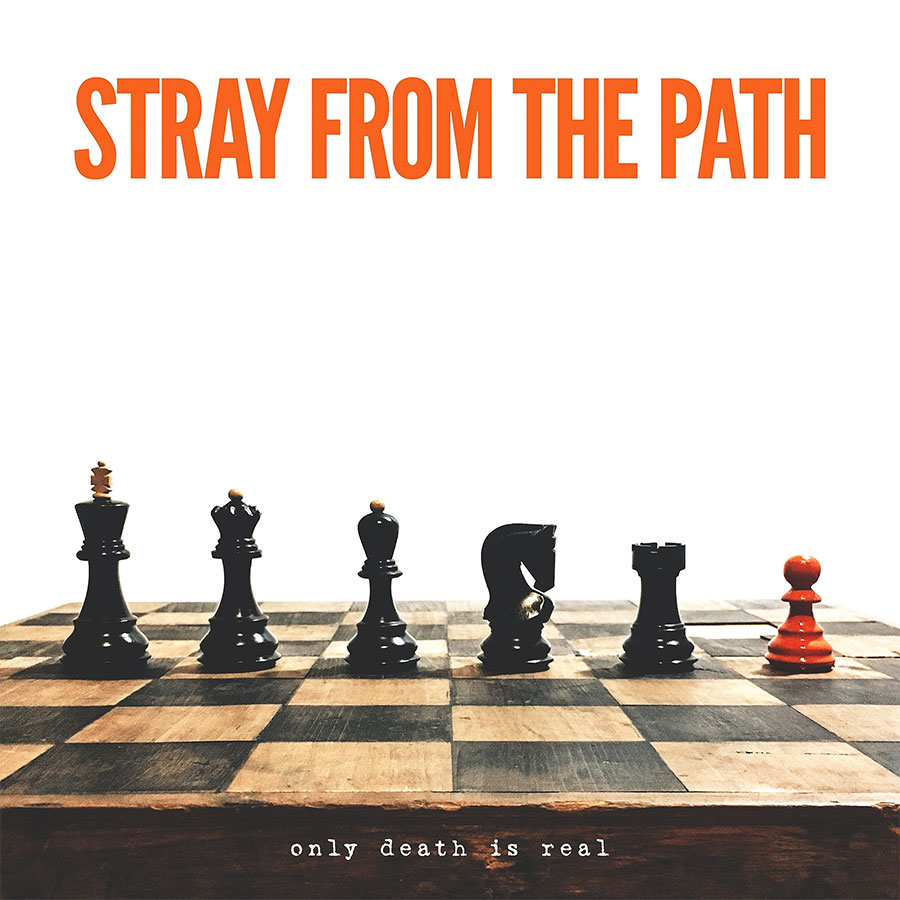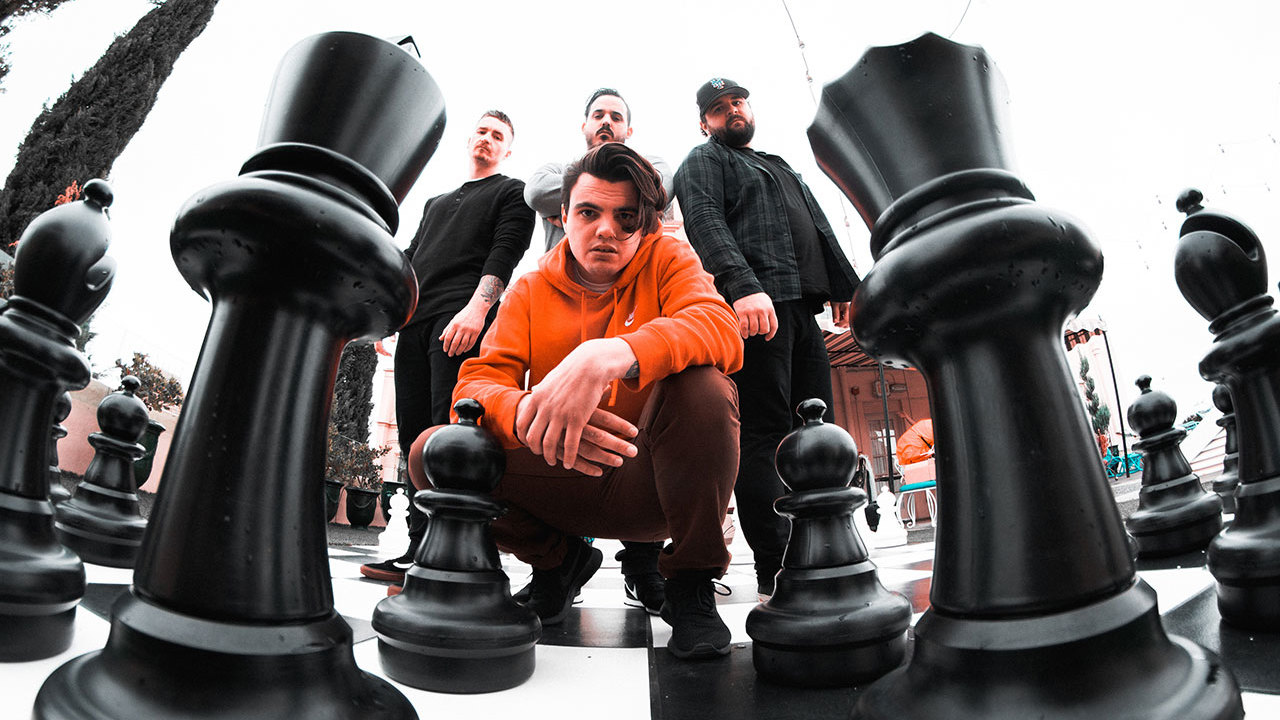“Our art is a reflection of our reality.”
These are the blunt but poignant words of Tom Williams, guitarist and founding member of Stray From The Path, who have just released the most politically aggressive album of the year. No strangers to getting their hands dirty in the world of politics, Tom admits that SFTP’s music is more pointed now “because the political climate of the world is nuts. It’s not an angle we’re trying to play, that’s just the world.”
Tom is talking to us over the phone as he takes a break from packing for his band’s three-month trek around North America and Europe, in support of new album Only Death Is Real, the follow-up to 2015’s Subliminal Criminals and the first record with new drummer Craig Reynolds. The new album is a savage attack on modern society with its crosshairs targeting the American government, corruption and prejudice.
The first taste we received of Only Death Is Real came in the form of The House Always Wins, which was released on the day of the United States election last year.
“We knew where things were going when Trump got the nomination and all of the sketchy stuff that went down with Hillary. We knew we wanted to write that song and release it on election day,” says Tom, reflecting on the origins of the record, going on to admit that it doesn’t speak for the rest of the record in terms of sound and tone.
It wasn’t until the release of Goodnight Alt-Right in July that the world at large were exposed to what Stray’s new album was all about. Borrowing the chorus line from Dead Kennedys’ iconic track Nazi Punks Fuck Off, the band’s colours were nailed firmly to the mast in case anyone was in doubt.
Of course, not everyone understood the band’s motives at first time round.
“One regret I have is giving people too much credit,” says Tom. “People to this day think that video is about curb-stomping Trump conservatives, but it’s not. He’s a white terrorist planning a terror attack and he’s stopped by a group of vigilantes.”
“We aren’t violent people, we’ve never done that and will never do that, that’s why we make songs and videos to express how we feel, instead of getting into a car and driving it into a bunch of people,” he continues, referencing the fatal attack in Charlottesville last month.
“We released the song before those events happened; but then people understood what we were talking about. When we put it out, listeners of the band were asking ‘Why are you tackling this subject? Nazis aren’t a thing.’ But here you go, they are.”
Soon after the song started making waves online, it was picked up on Twitter by Paul Joseph Watson – editor-at-large for Infowars, who tweeted “SJWs made a metal song and yes it’s as bad as you think. RIP your thumbs down.”
The video was swiftly bombarded with thousands of negative comments on YouTube and has been disliked 57,000 times. Tom didn’t know who Paul was before the Twitterstorm, although sees his comments as a positive.
“If our music makes you feel something then it’s a win for us, even if it’s tens of thousands of people who are hating on it because they believe certain things.”
But how do you feel about being deemed a Social Justice Warrior?
“I hate the term, but what do you want me to be? They just have terms for everybody now. First you’re a social justice warrior then if you’re offended by something you’re a snowflake. Look, you can hate the video, hate the song, hate the message, but to think that writing a song against racism is a bad thing, I can’t wrap my head around that.”
- Stray From The Path issue track in tribute to friends The Ghost Inside
- Depeche Mode denounce alt-right leader’s claims
- Stray From The Path return with new single and album
- Read Classic Rock, Metal Hammer & Prog for free with TeamRock+
Tom has a long history of being interested in politically-motivated music. Growing up on the sounds of Refused and Anti-Flag, it was Rage Against The Machine that had the biggest influence on the guitarist. In fact, throughout his band’s career, Rage are the one constant reference point often bandied around by fans and critics alike, something which isn’t lost on Tom.
“I don’t see it as blatantly as some other people do because Rage never played fast, they never played breakdowns, but the influence is there,” he admits. “They’re my favourite band of all time but they haven’t made music in 17 years, so if anything that I write is influenced by them it’s because I miss that style of music.”
It was actually listening to RATM’s Guerrilla Radio for the first time that sparked something within Tom to take a look at the world differently and become more conscious of the US political climate, with particular attention paid to the line ‘More for Gore or the son of a drug lord. None of the above. Fuck it, cut the cord!’
The music also inspired Tom to not only seek out music with meaning, but to create something with a message.
“It made me realise that music should have a substance. If you’re lucky enough to get a crowd and a stage like we do, to put that to waste is kind of a shame. We have to use what we’re so fortunate to get, and use it for good. Whether you agree or disagree, we’re writing music that makes you feel something, and to me that’s a victory in itself.”
The meaning behind Only Death Is Real is two-fold. On the one hand, it’s the hierarchy of life, as symbolised in the album artwork of chess pieces. The king is the elite, the queen is the government, the bishop is the church, the knight is the military and the rook is the police. The pawn represents everyone else. The billions of people around the world living on the bottom rung of the ladder. The album opens with the line ‘They want the pawns to fight each other and say that we’re not the same, well I say don’t hate the player hate the game,’ pointing the finger at the ruling elite trying to divide and conquer society.

Although it’s the idea of death that makes up the other side of the record.
“People care about so many things,” Tom begins, thoughtfully. “Being in a band, being into sports, or sex, drugs, alcohol, or movies or whatever people consume their lives with. The only thing that’s certain on this planet is that death will come for everybody at some point.”
Last year, Architects’ guitarist Tom Searle passed away at the age of 28 following a battle with cancer. A tragedy that hit the metal community hard, not least because of how young Searle was. It gave fans and friends a new perspective on life and what it means, Stray From The Path included.
“His death was a big blow for us,” says Tom. “Architects are our best friends. We played their first American tour, our first UK tour was with them, we’ve been best friends for ten years now. Every single country I’ve toured in my life I’ve done it with them, and they’re a special band to us. That was definitely tough and a big eye-opener to what life is and isn’t.”
“Within the band we talk about death a lot and over the past two years it’s been a constant subject. Being a band like Stray where you get so caught up and passionate about the lyrics, you’ve got to understand that it’s all going to be taken from you, and sometimes things like that shouldn’t consume your life because it gets in the way of living it.”
It might sound morbid for a band in their 30s to be so fascinated with death, but Tom is keen to shatter the illusion of it being a taboo subject. As people we often shy away from discussing dying over the dinner table, when perhaps it would be much more healthy and beneficial to talk about the great unifier. The one thing that every human has in common.
“Everyone has experienced death and loss, and it’s something that people always try to get over, but you should know that people can go at any minute,” says Tom. “When I leave tour and I say goodbye to my wife, it could be the last time. When I say goodbye to my dad, he could die while I’m on the road. You should never leave grudges or regrets out there. Make sure that you live every day like it could be your last.”
Sometimes it’s not about winning the game, it’s about having fun.
Only Death Is Real is out now and available to order online.
Comeback Kid: Hardcore can change lives
The 10 best hardcore albums, as chosen by Mutoid Man's Ben Koller
